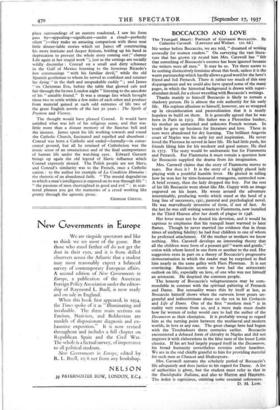BOCCACCIO AND LOVE
The Tranquil- Heart : Portrait of Giovanni Boccaccio. By Catherine Carswell. (Lawrence and Wishart. 12$. 6d.)
No writer before Boccaccio, we are told, " dreamed of writing avowedly for women readers." On surveying the vast litera- ture that has grown up round him Mrs. Carswell has " felt that something of Boccaccio's essence has been ignored because the writers were all men." It may be so. Yet there seems to be nothing distinctively feminine about this book, unless it is the warm partisanship which hardly allows a good word for the hero's friend and foil Petrarch. There is rather too much of this easy disparagement and we could also have spared some of the many pages, in which the historical background is drawn with super- abundant detail, for a closer wrestling with Boccaccio's writings.
Thanks mainly to himself Boccaccio is likely to remain a shadowy person. He is almost the sole authority for his early life. His copious allusions to himself, however, are so wrapped up in circumlocution and pastoralisation that it is nearly hopeless to build on them. It is generally agreed that he was born in Paris in 1313. His father was a Florentine banker, his mother an unmarried and unknown French woman. In youth he gave up business for literature and love. These in turn were abandoned for dry learning. The brilliant Angevin court of Naples was his early joy and inspiration. He never loved the Florence he served in later life. He had little push, his friends liking him for his modesty and good nature. He died in 1375. The story would be undramatic but for Fiammetta and Petrarch. For Fiammetta it must remain a question how far Boccaccio supplied the drama from his imagination.
Mrs. Carswell claims that the story of Fiammetta moves to tears. But does it ? It is the story of a highly placed lady playing with a youthful humble lover. He gloried in telling how he won her by time-honoured stratagems, outmoded now. A brief ecstasy, then the lady dropped the boy. For the rest of his life Boccaccio went about like Mr. Guppy with an image engraved on his heart. He wrote around the adventure interminably, producing works which stand at the head of a long line of successors, epic, pastoral and psychological novel. He was marvellously inventive of form, if not of fact. At the last he was still writing sonnets to Fiammetta, now installed in the Third Heaven after her death of plague in 1348.
Her lover must not be denied his devotion, and it would be captious to emphasise that his tranquil heart warmed to later flames. Though he never married (no evidence that in those times of undying fidelity) he had four children to one of whom he professed attachment. Of the mother or mothers we know nothing. Mrs. Carswell develops an interesting theory that all the children were born of a peasant girl "warm and gentle," union with whom lasted in one form or another to the end. Her suggestion rests in part on a theory of Boccaccio's progressive democratisation in which the reader may be surprised to find him nearly in the same galley with Piers PlOwman. It is not convincing. Boccaccio seems to have had the aristocratic outlook on life, especially on love, of one who was not himself an aristocrat. He despised the common people.
The honesty of Boccaccio's voluptuousness may be com- mendable in contrast with the -spiritual paltering of Petrarch and Dante. But sensuality wears thin by itself at last, as Boccaccio himself shows when the outworn lover pours un- grateful and indiscriminate abuse on the sex in his Corbaccio and Life of Dante. One of the first " modern men " is in reality very remote from us, and a mere male must doubt how far women of today would care to hail the author of the Decameron as their champion. It is probably wrong to regard him as the turning point between the mediaeval and modern worlds, in love at any rate. -The great change here had begun with the Troubadours three centuries earlier. Boccaccio encountered a debased form of chivalry in Naples and did not improve it with elaborations in the false taste of the lesser. Latin classics. If his art had largely purged itself in the Decameron, his broad humanity nevertheless remains rather heartless. We are in the end chiefly grateful to him for providing material for such men as Chaucer and Shakespeare.
Mrs. Carswell narrates the scholarly period - of Boccaccio's life adequately and does justice to his regard• for Dante. A list of authorities is given, but the student must refer to that in the Enciclopedia Ilaliana, and also to Hutton and Hauvette. The index is capricious, omitting some essential references.










































 Previous page
Previous page